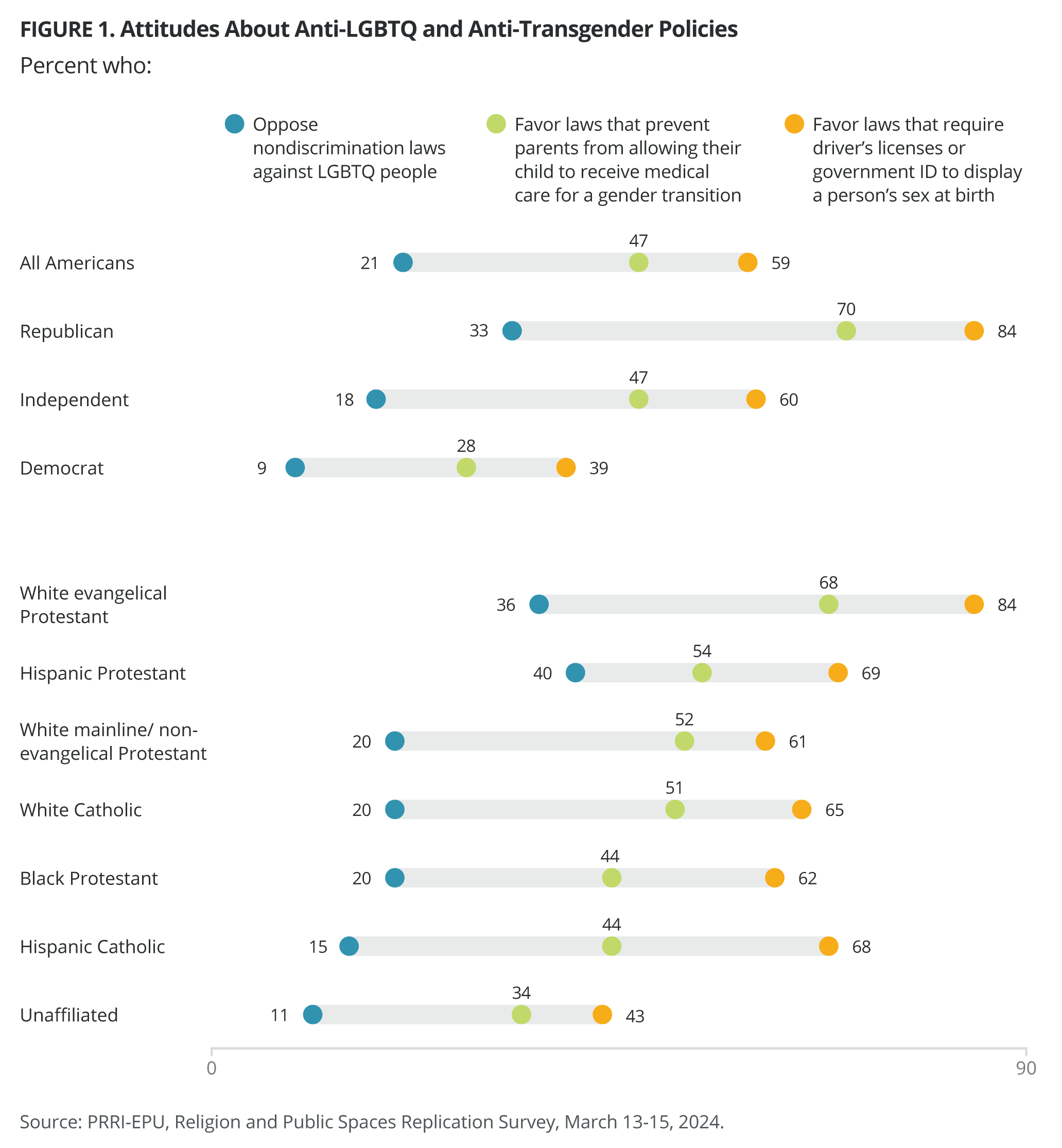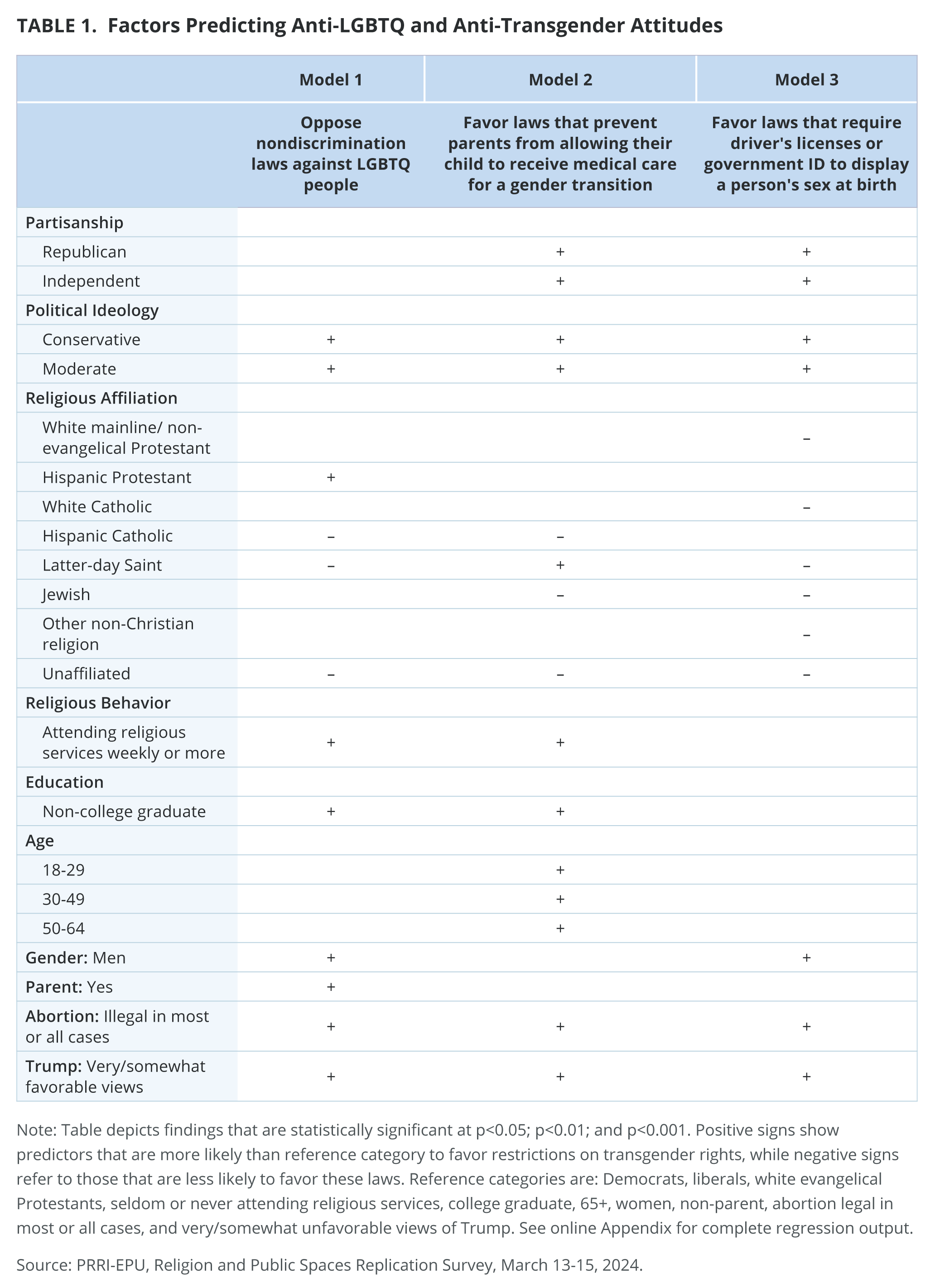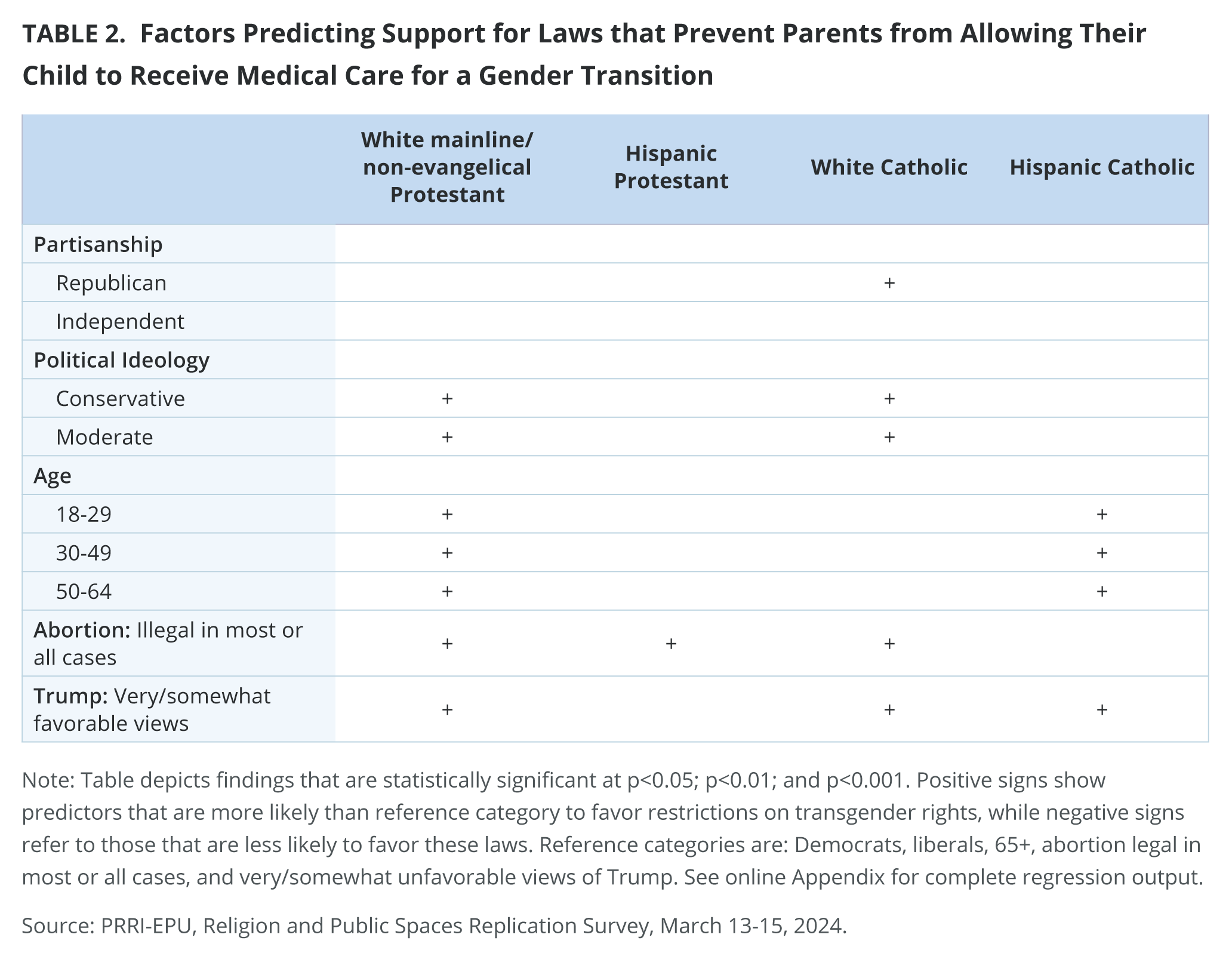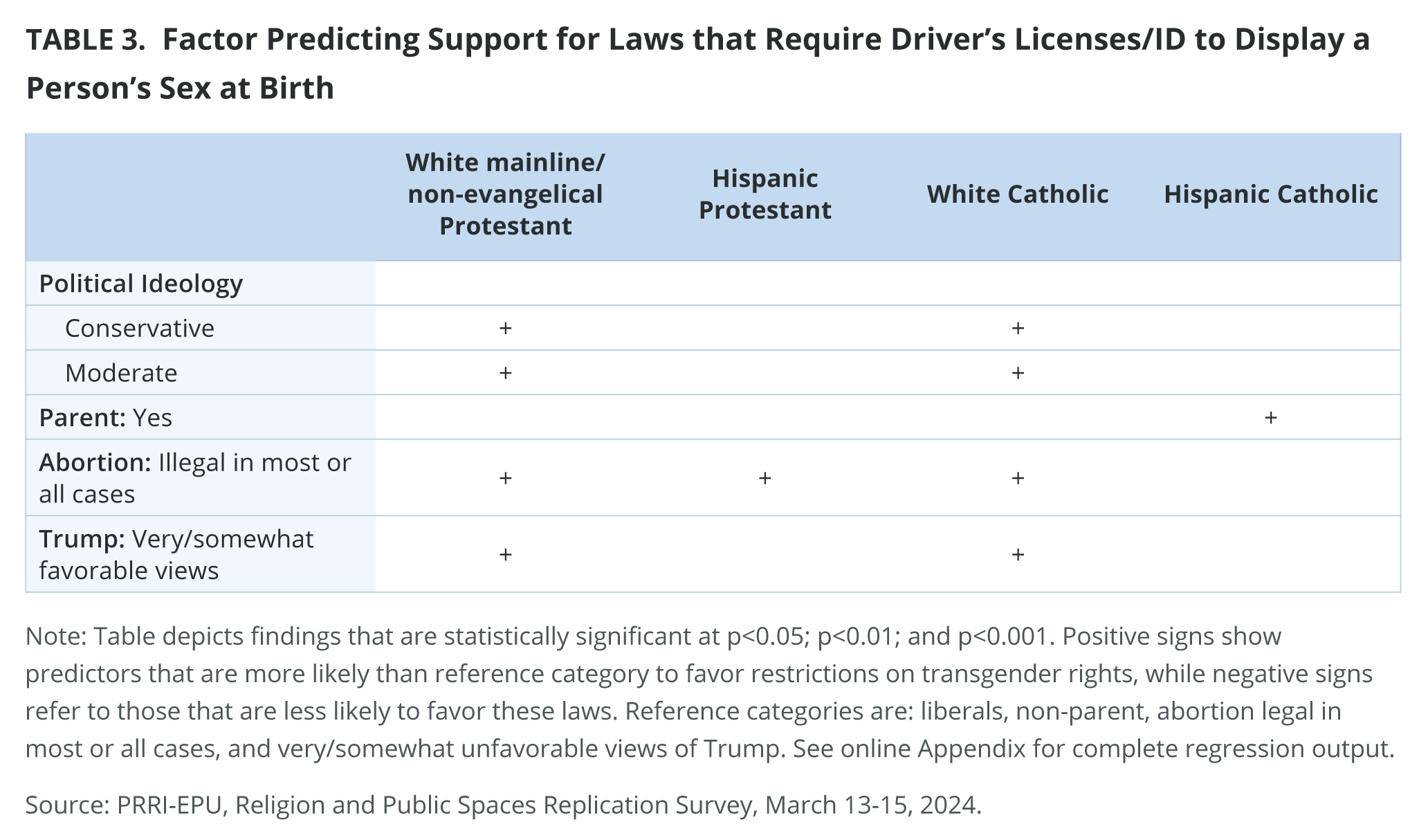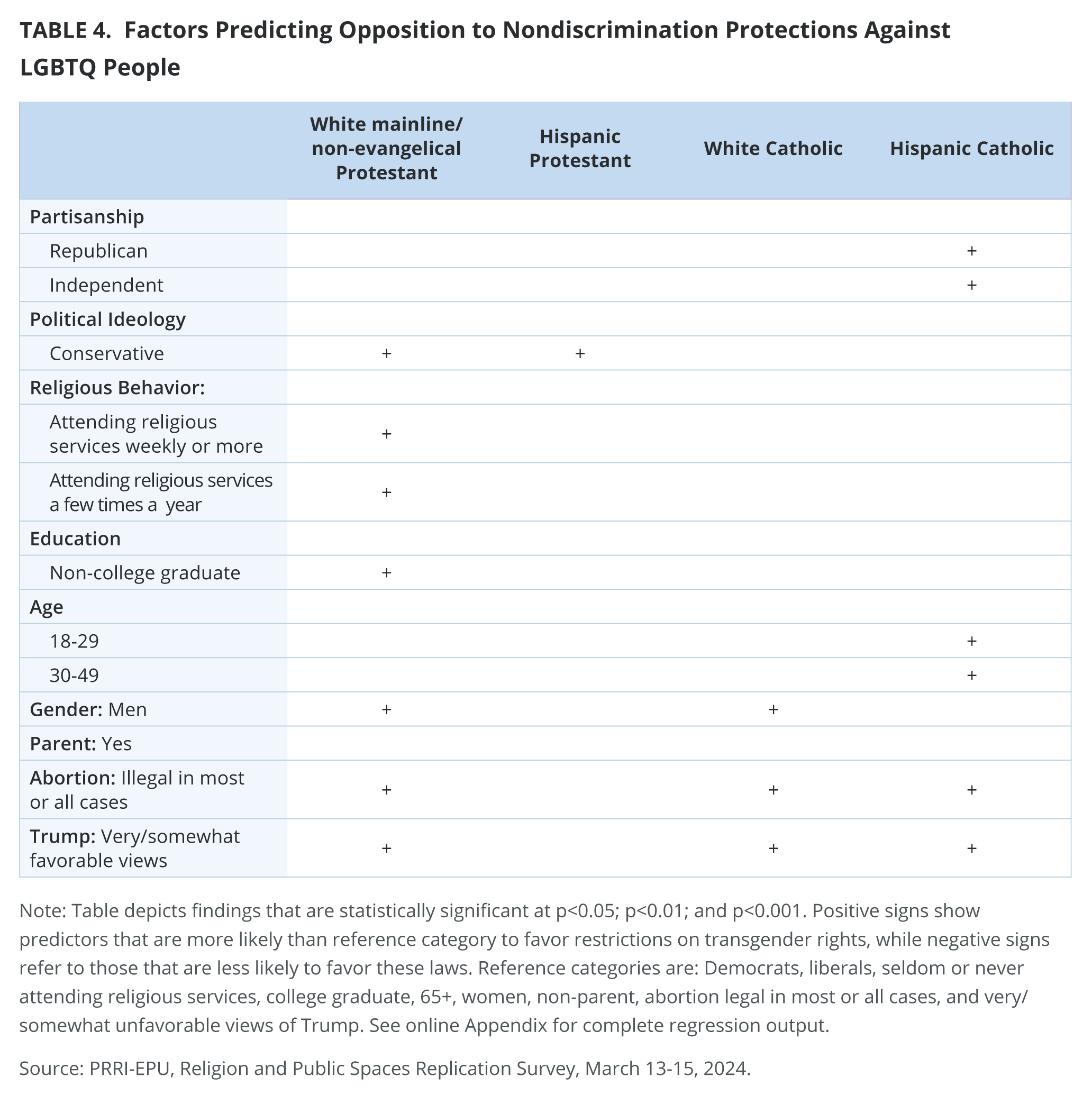PRRI’s work consistently finds that strong majorities of Americans support nondiscrimination protections for LGBTQ Americans. Americans are more divided, however, when it comes to attitudes about policies regarding transgender Americans’ rights specifically, which are being fiercely contested in state legislatures around the nation. This analysis takes a closer look at attitudes about two policies that impact the transgender community: laws that would prevent parents from allowing their child to receive medical care for a gender transition and laws that require government Identifications, such as driver’s licenses, to display the person’s sex at birth rather than gender identity.
Data collected in a recent PRRI survey shows that nearly six in ten Americans (59%) favor laws that require driver’s licenses to display the person’s sex at birth, rather than gender identity, and under half (47%) favor laws that prevent parents from allowing their child to receive medical care for a gender transition, compared with two in ten who oppose nondiscrimination protections for LGBTQ people (21%).
Partisans’ views diverge significantly. While most Republicans favor laws that require driver’s licenses to display a person’s sex at birth (84%) and laws that prevent parents from allowing gender transition for their children (70%), just 39% and 28% of Democrats, respectively, favor these policies. As a point of reference, Republicans are more than three times as likely as Democrats to oppose nondiscrimination laws (33% vs. 9%). Independents closely mirror all Americans on these three questions (60%, 47%, 18%, respectively).
Religious Americans’ views about all three policies are far from monolithic. We place special emphasis here on what we term the neglected or overlooked “religious middle:” white mainline, non-evangelical Protestants; white and Hispanic Catholics; and Hispanic Protestants, who together represent roughly four in ten Americans, and who also skew more moderate — and more bipartisan — in their political leanings than white evangelical Protestants, who lean far more Republican, or religiously unaffiliated Americans and Black Protestants, who lean far more Democratic.
Most Americans of faith are supportive of broader nondiscrimination protections for LGBTQ Americans, with just two in ten white mainline/non-evangelical Protestants (20%), white Catholics (20%), and Black Protestants (20%) opposing LGBTQ nondiscrimination laws. Opposition to such laws is even lower among Hispanic Catholics (15%) and unaffiliated Americans (11%), but highest among Hispanic Protestants (40%) and white evangelical Protestants (36%).
Turning to attitudes toward policies that affect transgender Americans, white evangelicals emerge as the group most supportive of anti-transgender policies, while the unaffiliated are the least supportive. Among the “religious middle” categories, Hispanic Protestants (69%) and Hispanic Catholics (68%) are most likely to favor laws that require driver’s licenses or government ID to display a person’s sex at birth rather than their gender identity, followed by white Catholics (65%) and white mainline/ non-evangelical Protestants (61%). A slim majority of Hispanic Protestants (54%), white mainline/ non-evangelical Protestants (52%), and white Catholics (51%) favor laws preventing parents from allowing their child to receive medical care for a gender transition, while fewer than half of Hispanic Catholics favor this law. Black Protestants hold similar positions to most Americans who compose the neglected religious middle.
What Explains Anti-LGBTQ and Anti-Transgender Attitudes?
We conducted multivariate regression analyses to illuminate the underlying factors driving attitudes about these LGBTQ and transgender policies. In addition to controlling for religious affiliation and attendance, the regression models consider a range of political and socioeconomic characteristics, such as education, age, gender, partisanship, and political ideology. For the sake of brevity, we report positive/negative signs in Table 1 to indicate when such variables are statistically driving Americans’ attitudes on these in comparison to a specific reference category, noted at the bottom of the Table. See the online appendix for full regression model outputs, which includes calculated odds-ratios.
Table 1 shows that both partisanship and ideology are significantly linked to LGBTQ policy views among all Americans. As reported in the online appendix, Republicans are about twice as likely as Democrats to favor laws that prevent parents from allowing their child to receive medical care for a gender transition and laws that require driver’s licenses to display a person’s sex at birth. Ideology is even more impactful on such views: conservatives are about three or four times as likely as liberals to favor both laws. Similarly, moderates are twice or nearly three times as likely to favor both laws. In comparison, conservatives and moderates are roughly twice as likely as liberals to oppose nondiscrimination protections for LGBTQ people, while partisanship is not a significant factor in understanding views on such protections once controlling for other variables.
White mainline/non-evangelical Protestants, white Catholics, Latter-day Saints, Jewish Americans, other non-Christians, and religiously unaffiliated Americans are less likely than white evangelical Protestants to favor laws that require driver’s licenses to display the person’s sex at birth, although fewer religious groups — including Hispanic Catholics, Jewish Americans, and unaffiliated Americans — are less likely than white evangelical Protestants to favor laws that prevent parents from allowing their child to receive medical care for a gender transition. Except for Latter-day Saints, who are twice as likely as white evangelical Protestants to favor this law, all other groups do not differ significantly. Black Protestants are omitted from the table because in all three cases, they hold statistically similar views as white evangelical Protestants once controlling for other factors.
Additionally, Americans who attend religious services frequently are 1.3 times more likely than those who seldom or never attend religious services to favor laws that prevent parents from allowing their child to receive medical care for a gender transition. Religious attendance does not factor into whether Americans are more likely to support laws that require driver’s licenses to display a person’s sex at birth rather than their gender identity.
As a comparison, Hispanic Protestants are about twice as likely as white evangelical Protestants to oppose nondiscrimination protections against LGBTQ people, while Hispanic Catholics, Latter-day Saints, and the unaffiliated are less likely to do so. Those who attend religious services frequently are 1.3 times more likely than those who attend never or seldom to oppose nondiscrimination protections.
Americans who say that abortion should be illegal in most or all cases and who view Trump favorably are about twice as likely or more as those who say that abortion should be legal in most or all cases or who view Trump unfavorably to favor all three policies affecting transgender Americans. Somewhat surprisingly, young Americans ages 18-29, ages 30-49, and ages 50-64 are about twice as likely as senior Americans ages 65 or older to favor laws that prevent parents from allowing their child to receive medical care for a gender transition.
What Explains Support for Laws That Prevent Parents From Allowing Their Child to Receive Medical Care for a Gender Transition Among the Religious Middle?
We also conducted separate regression models for each religious middle group: white mainline, non-evangelical Protestants, white and Hispanic Catholics, and Hispanic Protestants. (Our results table omits factors that do not emerge as differentiating attitudes among each group.)
With respect to attitudes on medical care for gender transitions among children, church attendance, education, gender, and parental status do not impact the views of Americans in the religious middle. In only one case does partisanship matter: Republican white Catholics are about twice (2.3 times) as likely as Democratic white Catholics to support laws that prevent parents from allowing their child to receive medical care for a gender transition.
Instead, ideology, views about abortion, and support for Trump appear more closely linked to support for such laws among Americans in the religious middle. Conservative and moderate white Catholics are more than twice (2.3) or three times (3.1) as likely as liberal white Catholics to support bans on gender transition-related medical care for children. Similarly, moderate and conservative white mainline/non-evangelical Protestants are roughly three times or five times as likely as their liberal counterparts to support these laws.
Younger white mainline/non-evangelical Protestants and Hispanic Catholics are more likely to favor laws that prevent parents from allowing their child to receive medical care for a gender transition than their counterparts who are 65 or older.
Finally, except for Hispanic Catholics, views on abortion legality matter to all religious middle groups in shaping views about this policy, while favorable views of Trump matter to white mainline/non-evangelical Protestants and white and Hispanic Catholics. Specifically, white mainline/non-evangelical Protestants, Hispanic Protestants, and white Catholics who view abortion as illegal in most or all cases are about twice or more as likely as those who view abortion as legal in most or all cases to favor laws that prevent parents from allowing their child to receive medical care for a gender transition. Similarly, white Catholics, white mainline/non-evangelical Protestants, and Hispanic Catholics who view Trump favorably are nearly twice or three times as likely as their counterparts who view him unfavorably to support this law.
What Explains Support for Laws that Require Driver’s Licenses/IDs to Display a Person’s Sex at Birth Among the Religious Middle?
When examining each religious middle group and their support for laws that would require driver’s licenses to display a person’s sex at birth, partisanship does not emerge as a significant factor; nor does church attendance, education, gender, or age.
The key distinguishing factors that drive support for this policy are ideology, holding socially conservative views on abortion, and support for Trump. Moderate and conservative white mainline/non-evangelical Protestants are more than three times (3.4) or ten times (10.4) as likely as liberal white mainline/non-evangelical Protestants to support these laws regarding driver’s licenses. Also, moderate and conservative white Catholics are twice or three times as likely as liberal white Catholics to support this policy.
Views on abortion legality matter for white mainline/non-evangelical Protestants, Hispanic Protestants, and white Catholics. Except for white mainline/non-evangelical Protestants (whose odds ratio are 1.9), Hispanic Protestants and white Catholics who view abortion as illegal in most or all cases are nearly four times as likely as those who view abortion as legal in most or all cases to favor laws that require driver’s licenses to display a person’s sex at birth.
Favorable views of Trump also drive support for this policy, but only among white mainline/non-evangelical Protestants and white Catholics. White mainline/non-evangelical Protestants who view Trump favorably are more than four times as likely (4.3) as those who view Trump unfavorably to favor laws that require driver’s licenses to display a person’s sex at birth. Similarly, white Catholics who view Trump favorably are nearly three times as likely (2.8) as those who view Trump unfavorably to support these laws.
Finally, Hispanic Catholic parents are the only religious middle group that is more than twice (2.3) as likely as their non-parent counterparts to favor laws that require driver’s licenses to display a person’s sex at birth.
What Explains Opposition to LGBTQ Nondiscrimination Laws Among the Religious Middle?
Turning to support for nondiscrimination laws, partisanship emerges as a statistically significant factor for Hispanic Catholics only. Republican and independent Hispanic Catholics are three or more times as likely as Democratic Hispanic Catholics to oppose nondiscrimination laws against LGBTQ people. Conservative white mainline/non-evangelical Protestants are three times (3.1) as likely as liberal white mainline/non-evangelical Protestants to oppose these laws, while conservative Hispanic Protestants are more than nine times (9.2) as likely as liberal Hispanic Protestants to oppose these laws.
Much like attitudes concerning transgender-specific rights, those members of the religious middle who oppose abortion views and who view Trump favorably also tend to hold conservative positions on LGBTQ nondiscrimination policies. For white mainline/non-evangelical Protestants, church attendance, education, and gender also factor into opposition to nondiscrimination policies. Younger Hispanic Catholics are more likely than Hispanic Catholics 65 or older to oppose these laws.
As both state and national elected officials continue to debate and pass policies that impact the lives of LGBTQ Americans, and the Supreme Court has agreed to hear challenges next year to state laws that ban medical treatment for minors for the purpose of gender transition, this Spotlight Analysis serves as an important reminder of the importance of understanding religion’s role on driving attitudes on these often-contentious issues. As illustrated here, the religious viewpoint on these attitudes is far from monolithic, and many people of faith are supportive of protections for LGBTQ Americans, including the transgender community. Even among the Americans who hail from arguably more centrist denominations, what we term the “religious middle,” ideology, views on social issues such as abortion and support for Trump have the ability to shape many peoples’ views on transgender rights.
See online appendix here.


